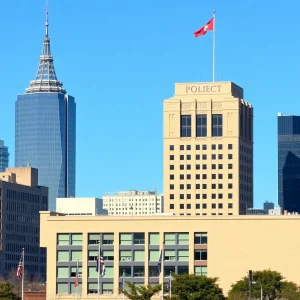Bowling Green Bank Building Ready for Revitalization
In the heart of Bowling Green, Kentucky, the historic black and white building at 903 College Street is poised for a new chapter. This landmark, which stands tall over Fountain Square, has a rich and varied history dating back to 1866 when it was first known as Odeon Hall. Originally an auditorium for local productions, it has undergone several transformations over the years, marking its significance in the local community.
A Glimpse into History
The building transitioned to the Potter Opera House in 1887 when local banker and entrepreneur Pleasant J. Potter acquired it. Despite a fire that destroyed the original opera house just two years later, it was rebuilt, continuing its role as a venue for entertainment. After changing hands multiple times, including a period as Bowling Green Bank and Trust, the building has remained primarily unused in recent years, existing as a private property.
New Beginnings on the Horizon
Now, the Downtown Redevelopment Authority (DRA) is stepping forward with plans to rejuvenate this historic structure. In a recent announcement, the authority revealed that it has secured an option to purchase and revitalize the iconic building. Executive Director Ron Murphy shared that the DRA aims to “breathe new life” into the three-story structure, indicating a robust plan in the works.
Plans for Renovation
The DRA intends to collaborate with various public and private investors, as well as developers, to ensure the project’s success. Murphy highlights their commitment to not only preserving the building’s impressive facade but also adapting the interior space to meet the needs of Kentucky’s third largest city. This initiative follows two other successful renovations by the DRA, which included enhancements of Circus Square Park and the historic building located at 601 State Street.
Preservation and Adaptation
As part of its pledge towards sustainable development, the DRA plans to retain the essence of the original opera house while making necessary updates to its interior design. “In keeping with the Downtown Redevelopment Authority’s mission of sustainable/adaptive reuse,” Murphy noted, “efforts will be made to preserve the integrity of the original opera house facade while adapting a gutted interior.” This approach emphasizes the value of maintaining historical integrity while also serving the community’s current needs.
A Call to Community Engagement
To ensure that local voices are heard throughout the process, the DRA plans to hold informational meetings with community members and officials. This outreach aims to gather feedback and foster collaboration as the project moves forward.
Urgency in Restoration
Murphy has expressed a strong sense of urgency regarding the project, especially in light of recent events where three similar historic buildings in the downtown area were lost to fires. The DRA is keenly aware of the risks and hopes this revitalization can prevent further losses of such vital cultural landmarks.
Conclusion
As discussions and planning continue, the future of the historical Potter Opera House looks promising. The proposed initiative by the Downtown Redevelopment Authority not only aims to restore a beloved community fixture but also to bring fresh opportunities to Bowling Green’s downtown area. This is a developing story, and updates are forthcoming as the DRA moves forward with its plans to revitalize this cherished piece of history.







